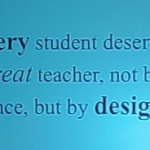At an event the other day with a group of teachers I had just met, one made the offhand comment that the real world doesn’t differentiate. Her opinion was met with general agreement by the other teachers.
The undertone of her comment was that we’re setting students up by modifying our instruction to allow for their individual differences. After being accommodated throughout their education, how will students survive the “quiet desperation” of their “solitary, poor, nasty, brutish, and short lives?”
So, maybe we shouldn’t differentiate, because whereas students may learn more when we do, they’ll be weaker adults for having been so obliged.
Driving home from the event, I realized my new acquaintance was just plain wrong, and it takes only a few examples prove that point:
- The tax code and government entitlements differentiate depending on multiple factors in a person’s life – how much they make, their health, their marital and family status, home ownership, and so forth.
- Sporting leagues differentiate through categories based on ability, gender, size, and age. Most states have divisions for interscholastic competitions based on school population. I have friends who race and compete well in their age bracket but wouldn’t stand a chance without the differentiation. What are the minor leagues if not differentiation?
- How many accomplished professionals pay gratitude to a seasoned veteran who “showed them the ropes” or to a structured mentoring or apprentice program, that amount to differentiation?
- Don’t golfers use handicaps to make the game more competitive?
- The Americans with Disabilities Act seeks to ensure that people with disabilities have complete access to the public arena.
- Many cities have High Occupancy Vehicle lanes for carpoolers.
So in fact, we differentiate all the time all over the place. Sometimes our motives for differentiation are generous, sometimes selfish, sometimes mean. But no matter its motivation, society is awash with differentiation.
So what does that suggest for education? Maybe we should infuse more differentiation and not limit it to instructional practices. Teachers ask the question on Facebook all the time: If we’re expected to differentiate our teaching why do we give standardized test? Career paths should be differentiated by endowing (and compensating) teachers not just for years, education, and added duties like sponsoring clubs but also for roles that include mentoring, delivering professional development, research, and administration, to mention just four. Teachers could be evaluated an a differentiated scale based on their experience and assignment, with higher expectations placed on more accomplished teachers.
Of course most of this is happening somewhere, but only in bits and pieces and not systematically with comprehensive forethought.
I doubt I’ll see the colleagues I met at the event again, but if I did, I think I’d bring up differentiation in the real world one more time.









Comments 6
Hi Sandy
Thanks for sharing this piece – you make a great point around differentiation. Maybe it’s time to shift our thinking and use a different term – is “differentiated” worn out and over used? It reminds me of the avatar teacher youtube video – https://www.youtube.com/watch?v=kn8faeuQjE0
In this clip the term differentiated is used over and over – but what it looks like, sounds like or means is not discussed. I wonder how many teachers hear the term and just shut down based on their experience with it or the negative impact it may have become in some schools.
I agree with you, Sandy. If we want students to get the most out of our classes, I firmly believe we need to meet students where they are. However, I do agree with the person with whom you had this discussion, too. Yes, we differentiate in our broader society, but we usually don’t do so based on skill level. So I would argue that you’re both correct: there isn’t as much differentiation in society that there is in K12 education (indeed, it doesn’t really exist on a widespread basis in higher education), but that does not mean that we should stop differentiating.
I go back and forth on the differentiation by skill level question. Certainly sports leagues do. And most careers, do, too, I think. Even though that’s one place where it gets tricky. Office politics can certainly determine who gets a promotion as much as merit. And in education professional differentiation is often backwards with the most accomplished teachers of obtaining and protecting the choices positions and schedules, while the newest and most vulnerable get stuck in the most challenging positions.
Thank you for pointing out so MANY ways in which life is differentiated. Engaging with NB candidates at August Institute this weekend, we spent a significant amount of time talking about how we make differentiation visible, meaningful, and effective as possible. The strategies and practices shared by educators in attendance were amazing! Think about the potential outcomes or possibilities that a student could experience as a result of having full access to learning. To our colleague who stated that differentiation poorly prepares kids I ask, who were your most influential teachers…and how did they make you recognize your potential? Would you blame that teacher for your weaknesses now or thank them for contributing to your success? Thank you Sandy!
Thanks Sandy. Those were really great examples! Like Dr. Robinson noted, maybe we are to go back to the drawing board and ensure as educators we have a true understanding of what differentiation is and what it is not. It sounds like (and I could be wrong) that maybe the event folks see differentiation as tracking or grouping students by ability or maybe even the dumbing down of instruction by teachers. But truly–differentiation is none of those things. It is developing instruction around patterns of student needs. It’s valuing and planning for diversity. I agree with you Sandy-“differentiation is necessary for success with standards for a broad range of learners.”
Yes. The list goes on and on about differentiation in the real world. Sometimes I think we teachers have some “Real World” floating around d in our heads that we flash at students like a snapshot of the Slender Man. Spooooky. Maybe teachers should get a bit more in touch with reality when we make statements like the ones you heard. Not to mention the fact that these are the juveniles of the species we are talking g about. School should be a sheltered place, to a certain extent. School is not the “Real World” in this sense. And why should it be?